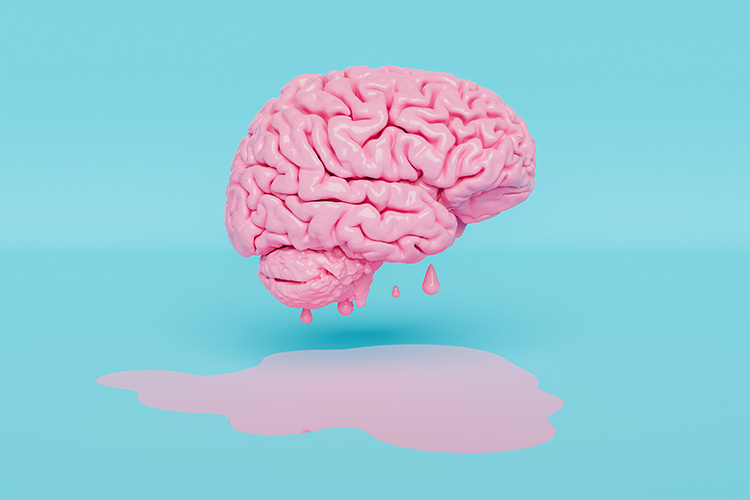We’re experiencing waves of extreme weather, which can make you feel more tired and disrupt your sleep due to the effects of heat on the body. José A. Morales García, a neuroscience professor and researcher at the Complutense University of Madrid, explains what happens to our brain.
The Effects of Heat on the Body
Summer offers many benefits for our body, including our brain. More sunlight hours lead to increased serotonin production, which positively affects our mood.
Sunlight also stimulates the production of the “sunshine vitamin,” vitamin D, which has multiple health benefits. But it’s not all good news: there is a heat threshold beyond which our brain does not function properly—104°F (40°C).
Humans are homeothermic, meaning, thanks to our hypothalamus—a region of the brain that regulates temperature—we can maintain a constant body temperature of around 98.6°F (37°C), regardless of the external temperature.
However, when our body temperature exceeds 104°F (40°C), the hypothalamus stops functioning correctly and fails to control our natural cooling system, perspiration (sweating). This can lead to heatstroke.
Attention, Balance, and Sleep Disrupted During Heatwaves
In such situations, the nervous system is especially vulnerable. The hypothalamus works overtime to maintain an adequate body temperature, sidelining other vital functions like attention, which slow down.
Similarly, the brain’s communication system is affected. Nerve impulses take longer to propagate, slowing our response times. We feel more tired and apathetic, impacting our mood and causing irritability and confusion.
Heat denatures proteins, causing them to lose their structure and effectively melt, which significantly affects neurons. This process also triggers an inflammatory response that disrupts nervous tissue’s homeostasis (balance).
High temperatures impact the blood-brain barrier, which protects our central nervous system, altering this balance. Particularly vulnerable are the Purkinje cells in the cerebellum, which are responsible for motor function. This is why a key symptom of heatstroke is motor weakness and severe coordination and balance impairment.
High Temperatures Affect Sleep Quality
High temperatures also disrupt our sleep. Another function of the hypothalamus is to regulate sleep-wake cycles, guided by external cues like light and temperature, indicating to the brain when it’s time to sleep.
Heat confuses the hypothalamus, leading to brain hyperexcitation and making it harder to fall asleep. Let’s not forget that our nervous system uses sleep hours to perform necessary maintenance functions for proper functioning, known as “restorative sleep.”
Dehydration: Another Problem with High Temperatures
When it exceeds 2% of body weight, dehydration can lead to severe issues like short-term memory loss, drowsiness, or muscle fatigue. It also prevents proper toxin elimination, causing them to accumulate in our bodies.
Does Drinking Cold Beverages Freeze Our Brain?
If you think a cold drink might be a good solution to the heat, be careful! Our brain doesn’t like sudden temperature changes. A cold beverage can cause an ice-cream headache or an intense headache sensation known as “brain freeze.”
This occurs because we confuse the circulatory system, which confuses the brain, responding with a pain alert. Our body regulates temperature by contracting peripheral blood vessels in the cold (vasoconstriction) to keep blood away from the skin and preserve body heat.
In the heat, peripheral vessels dilate (vasodilation) to transfer heat out of the body, making us sweat to cool down. However, drinking something cold suddenly constricts these dilated vessels, confusing the circulatory system with rapid changes from heat to cold.
These changes are detected by pain receptors in the palate and throat, which communicate with the brain via the trigeminal nerve, which sends sensory information from the head. Part of the trigeminal nerve extends through the middle of the face and forehead, causing the brain to misinterpret the location of the pain, a phenomenon known as “referred pain.” It happens in the palate or throat but feels like it’s in the brain.
Don’t panic, though. The brain doesn’t feel pain; it’s just a sensation that passes quickly. To avoid it, eat or drink slowly to help your palate adjust to the temperature change.
Not everyone experiences brain freeze, as it may be related to nerve sensitivity. Those who do may also be more prone to migraines.
Protect your brain from the heat, but be mindful of how you do it. A cold drink or ice cream might be worth a few seconds of discomfort. (Via The Conversation)


















